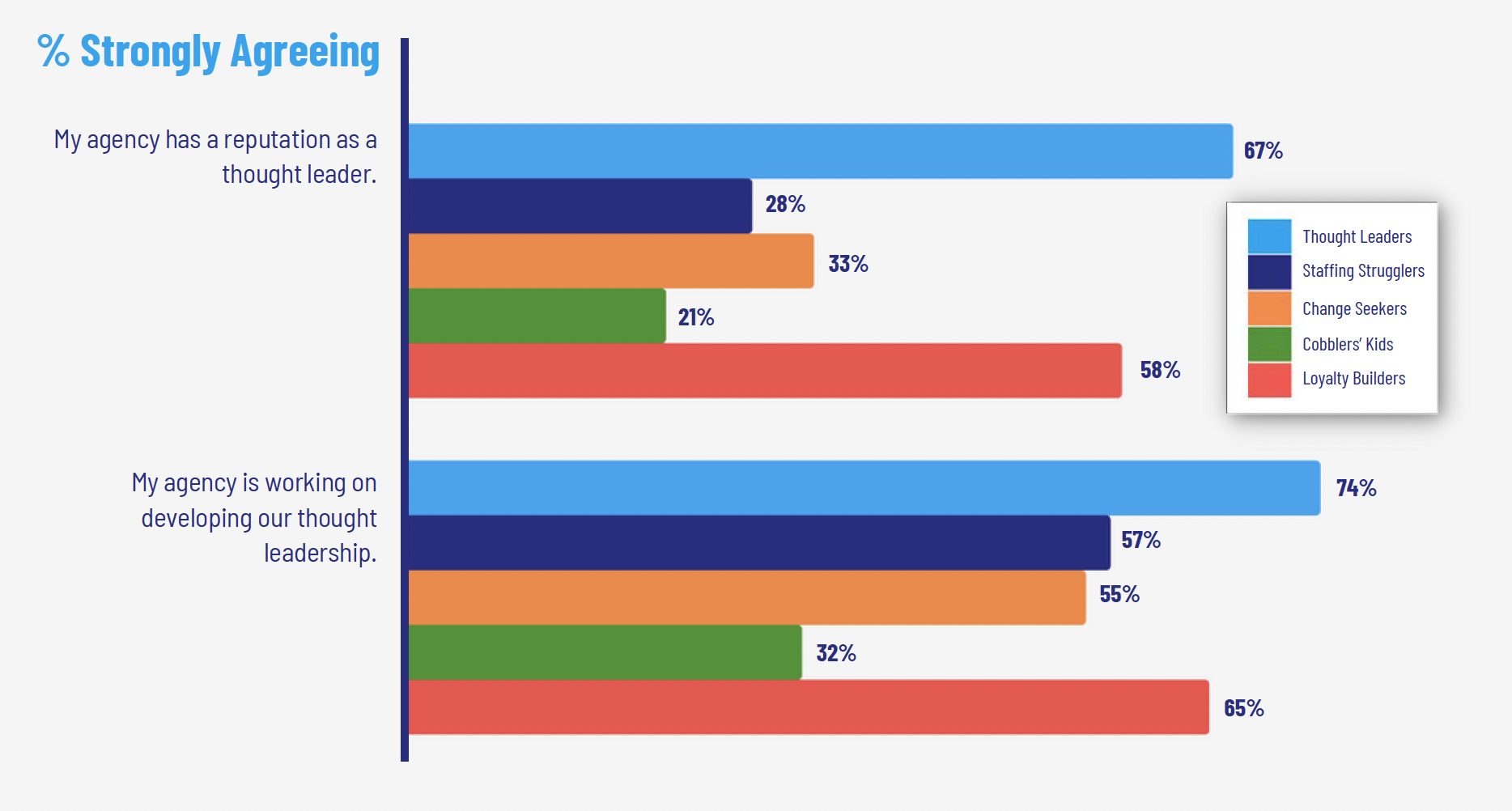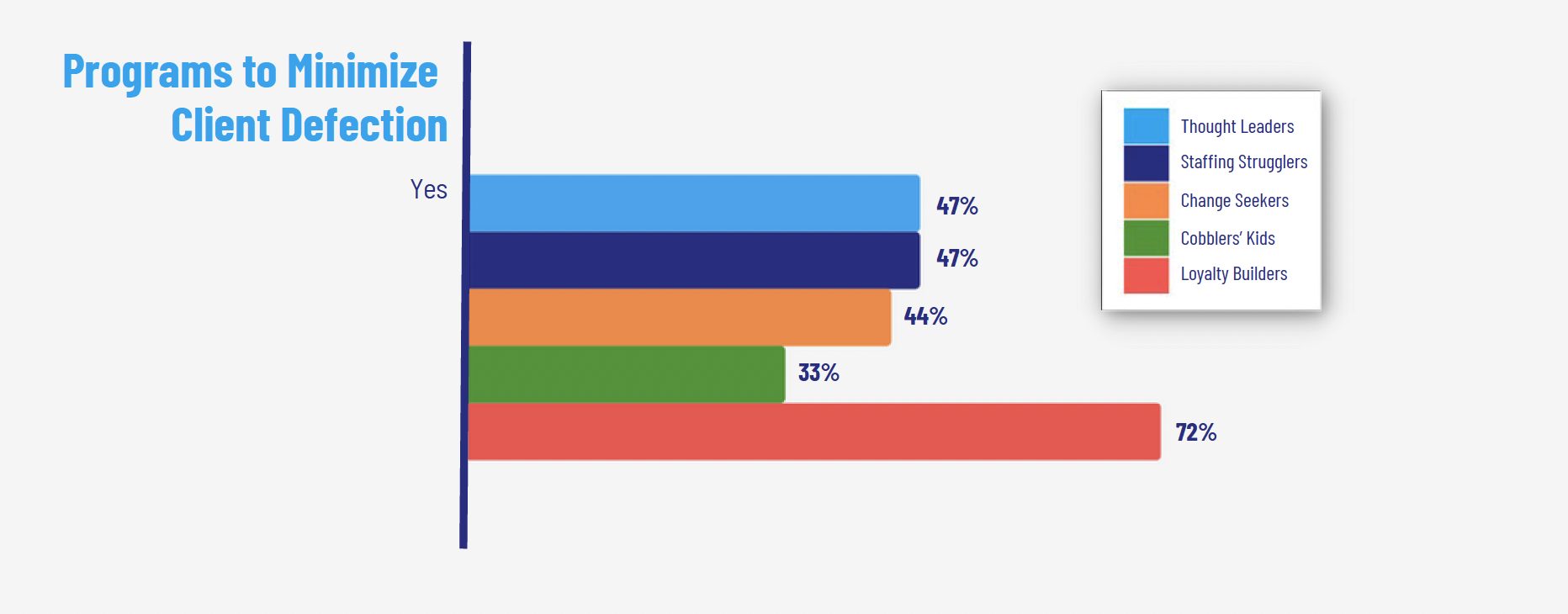
purple flower growing on crack street, soft focus
You might think successful agencies have higher revenue and more staff, but our research shows that’s not the case. A successful agency is just as likely to have fewer than 10 employees as it is to have over 100. Three in four respondents have worked in the industry for at least 11 years — and we see successful owners across years of experience.
So if it’s not experience or size, what sets successful agencies apart from struggling ones? What can agencies do to insulate themselves from the many challenges we’ve all faced in the last few years? We can look to our research for the answer.
Compared to other segments, Thought Leaders and Loyalty Builders report fewer concerns and challenges, especially with staffing, client retention, differentiation, and their reputations. The secret to becoming an unbeatable agency is to follow their lead as they have mastered the following four aspects of agency management and are the most likely to be unfazed during challenging times.
Find a Niche
Thought Leaders are defined by their clearly defined niche, which they say sets them apart from competitors. They use this niche positioning in their marketing and are actively developing thought leadership. Though Loyalty Builders are less likely to agree with these aspects of agency management strongly, they’re still much more likely than the remaining three segments to niche down.
For those with a niche, many of whom are Thought Leaders and Loyalty Builders, specific agency capabilities, specific client industries, and an understanding of a specific audience define that niche.
Nicheless owners are most likely to say they have trouble fitting their current client roster into a particular niche, which is kind of like fitting a square peg into a round hole. It’s just the wrong approach.
Instead, we recommend you decide what work you want to do and what clients you want to serve and center your business around that.
Put Strategy First
Under half of the respondents (45%) say they always include strategy services in programs for clients. And fewer still (39%) say they do so often.
Thought Leaders and Loyalty Builders, the resilient segments in the bunch, are more likely always to incorporate strategy services into their client programs. That’s not to say you have to offer strategy, but it’s an effective way to stay the course during economic fluctuations. Agency clients need to see what you offer is valuable, and it’s not going to be valuable if they can save time and money transitioning agency work into in-house work. Your offerings have to be indispensable.

Sure, you can skip strategy, but the owner segments that offer it report more resilience. And with less than half of owners saying they always include it as an offering, enhancing your strategic offerings can help you differentiate, especially if it goes hand-in-hand with specialized expertise, something that’s extremely appealing to agency clients.
Become a Thought Leader
Thought Leaders and Loyalty Builders are significantly more likely than the other segments to say their agency has a reputation as a thought leader and is working on its thought leadership.

Over half of these two segments say thought leadership is a top priority for their agency, and their results show it’s worth the investment; these two segments are significantly more likely to say their thought leadership efforts are extremely or very effective in attracting new clients.

When times are tough, thought leadership acts like a magnet, drawing new clients to your agency because they want to work with people who know what they’re doing and can impact their business. Case studies show results, but thought leadership shows influence and expertise. Many clients are looking for the best of the best. Becoming a thought leader puts your agency on center stage.
Develop Client Retention Programs
Though many respondents say they lost clients in 2021, Loyalty Builders were least likely to say this was true for them. Why? These respondents are also the most likely of all segments to say they have a program to minimize client defection.

For those with a program that minimizes client defection, it’s most likely to include regular reporting of work conducted and program performance. These two program features are also in the top responses for successfully minimizing client defection. These respondents are on to something — keeping clients informed as to progress and results can keep them loyal.
Become Unbeatable
Becoming more resilient comes down to honing in on your expertise, specialization, and differentiation, plus nurturing your relationships. Many agency owners might question where to find the time, energy, or resources to do these things, but if your ability to survive depends on it, isn’t it worth it? Following these recommendations is how you become like the Thought Leaders and Loyalty Builders from our research, boosting your resilience. To learn more about the segments and how they think about success, check out our executive summary.


Leave a Reply